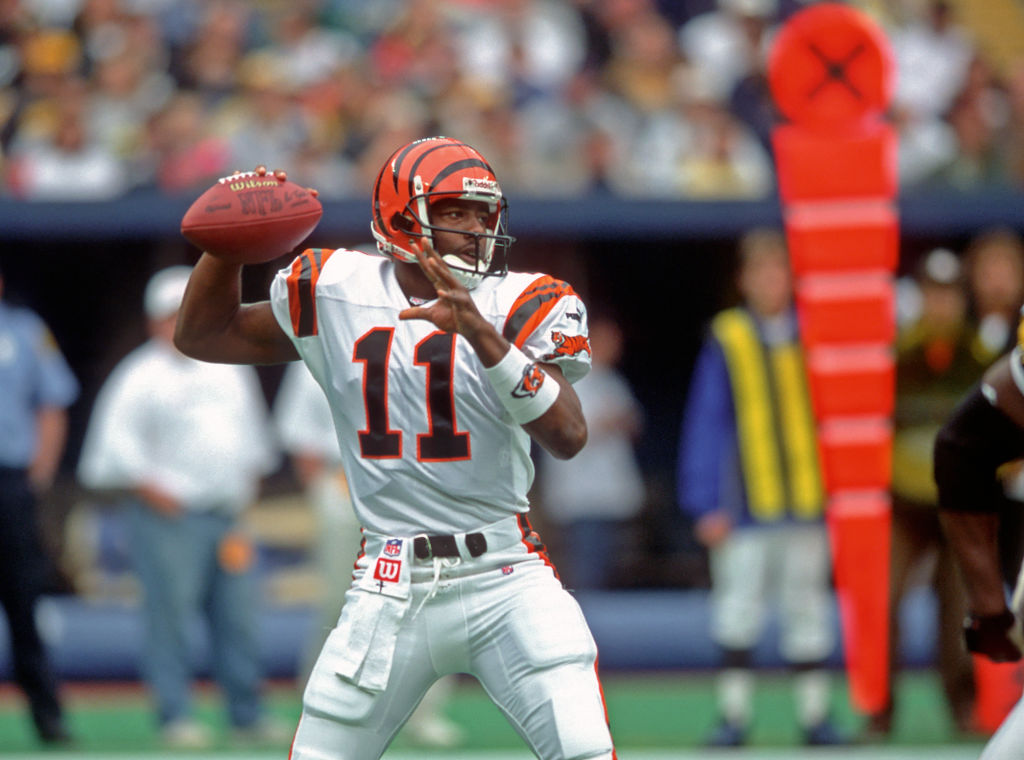NFL
First-Round Bust Akili Smith Blames Cincinnati Bengals for Losing Culture

If only the Cincinnati Bengals could do 1999 all over again. Then again, they are the Cincinnati Bengals so maybe they wouldn’t do anything different. Twenty-one years ago, the Bengals had the third pick in the 1999 NFL draft. They were in need of a quarterback, but the Cleveland Browns had already selected Tim Couch first and the Philadelphia Eagles followed by taking Donovan McNabb. The Bengals followed suit by selecting a quarterback, taking Oregon’s Akili Smith, and passing up what could’ve been a franchise-altering trade.
The Bengals shut down a monstrous offer from the New Orleans Saints
While the top three teams in the 1999 NFL draft were busy selecting quarterbacks, the New Orleans Saints were busy trying to work out a deal. Under first-year head coach Mike Ditka, the Saints were looking for a franchise running back. Ditka and the Saints had their sights set on the University of Texas running back Ricky Williams.
Ditka and the Saints were so desperate to land Williams that they were offering their entire slate of 1999 draft picks and more to move up to that third slot. The deal reportedly included every 1999 pick from the Saints, a 2000 first-round pick, a 2001 first-round pick, and a second-round pick in 2002. The Bengals turned it down.
Instead, the Bengals opted to select Akili Smith. That selection was painfully wrong on top of the fact they turned down the chance to reshape their future by nixing the Saints offer. Smith went on to make 17 starts in four seasons, throwing just five touchdowns. The Saints, meanwhile, landed Williams in a deal with the Washington Redskins.
Akili Smith admits his faults
Akili Smith got off to a late start with the Cincinnati Bengals after holding out during a contract dispute. He signed late and it hurt the young quarterback. Smith admitted he didn’t put in the necessary time required to get a first grasp of the playbook. He was still a young kid who just landed millions of dollars.
Smith said there were times when the game seemed easy to him, but there wasn’t any consistency with his play. He takes full blame for that. “There were times in there when the game was in slow-motion, and I was just out there executing,” Smith said back in 2009. “But for whatever reason, there was just no consistency I’ve got to take full responsibility because I was the one in that No. 11 jersey on that football field. That was me. No matter how I look at it, or anybody looks at it, that was Akili Smith out on that football field.”
The Bengals offensive coordinator at the time, Bob Bratkowski, said Smith had the athleticism to be a successful quarterback in the NFL, but the drive wasn’t always there. “It just didn’t work,” he said. “For his position, he wasn’t as diligent as he should have been.”
Akili Smith doesn’t take all the blame for the Bengals’ failures
In an interview with Shaun Chornobroff of the Wrightway Sports Network, Akili Smith reiterated some of the problems when he was with the Cincinnati Bengals were self-inflicted. Many, however, were not. Smith was quick to blame the organization for the lack of success on the field.
“The holdout actually hurt me a lot,” he said. “After the holdout was done, Cincinnati actually put me out on the field. In my opinion, I should’ve sat that first year and let Jeff Blake play. There was some stuff going on with the organization and I think even the organization would agree that they weren’t doing things right back in the day. There’s a list of examples we can give, but back then things just wasn’t right with the organization. I still talk to Corey Dillion and he’s still upset with some of the stuff that he was trying to get changed.”
Smith went on to elaborate. “The food, the travel, the strength and conditioning program. West coast games you’re supposed to leave on Friday, we left on Saturday. …On Saturday night at the hotels, once we landed and got situated and got ready to go for a Sunday game, our coaches were on the road scouting other collegiate athletes. There was no scouting department. There was no general manager so the coaches had to do it.”
When the Bengals eventually brought in Marvin Lewis, Smith said that changed the culture for the franchise. He said Lewis brought in those pieces that were needed and brought stability to the team. “Marvin Lewis was a savior to the Cincinnati Bengals. If they didn’t bring in Marvin Lewis, they might’ve been in that same age of what they were in under Akili Smith, under Dave Klingler, under Big Daddy Wilkinson, everybody they call a bust. All the busts might’ve had different careers under someone like a Marvin Lewis.”











